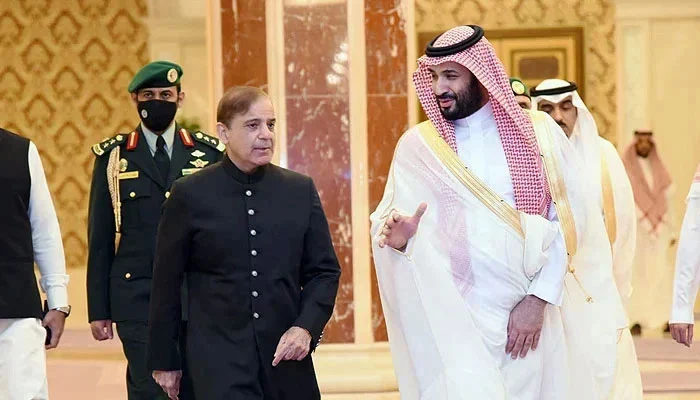Officials from the Ministry of Religious Affairs and the Director General (DG) of Hajj stated on Thursday that resolving the issue concerning the remaining 67,000 Hajj applicants can only be achieved through discussions at the level of Prime Minister Shehbaz Sharif and Saudi Crown Prince Mohammed Bin Salman (MBS), as reported by The News on Thursday.
This development unfolded during separate briefings provided by the officials to the National Assembly and the Senate Standing Committees on Religious Affairs, amidst diminishing hopes for thousands of Pakistani Hajj applicants to perform the pilgrimage this year.
Adding to the woes of the applicants, the officials revealed that private Hajj operators — who had collected advance payments from pilgrims and remitted them to Saudi Arabia — would likely not be able to secure a full refund of the unutilized amounts.
Federal Secretary for Religious Affairs Dr Ataur Rehman clarified that advance payments sent to the Saudi government through the DG Hajj would be refunded. However, he could not confirm the status of funds transferred privately or through informal channels (Hundi) for booking accommodations and transport.
DG Hajj Abdul Wahab Soomro, participating in the National Assembly standing committee meeting online from Saudi Arabia, explained that payments sent to the Saudi government’s account would be refunded after a 15% deduction, contingent upon a formal request from the Pakistani government.
However, he distanced the government from any liability for advance payments sent outside official channels for private bookings.
“The amount received in the digital wallet will be refunded, but we cannot account for funds sent privately or through unofficial means,” he stated.
Soomro confirmed that payments still held in the Pakistani government’s account would be refunded in full, disclosing that SAR1.1 billion had been collected from Hajj operators to date.
During the meeting, private tour operators accused the DG Hajj of initially transferring SAR50 million to an incorrect Saudi account, resulting in a 28-day delay in redirecting the funds. They also criticized the Religious Affairs Ministry’s Hajj wing for creating obstacles that prevented them from meeting deadlines.
Muhammad Bilal, a representative of the Hajj Organisers Association of Pakistan (HOAP), asserted that while operators had processed payments for 77,000 pilgrims by February 14th, the ministry prioritized the government Hajj scheme first.
He maintained that Pakistan could still secure the remaining quota if earnest efforts were made.
Federal Secretary Dr Ataur Rehman requested that any inquiry into the lapse of the 67,000 quota be deferred until after the Hajj operation concludes.
“As secretary, I assure accountability, but officials are currently overwhelmed with Hajj operations,” he said. He also disclosed that Saudi authorities had conveyed that there was no additional quota available for the 67,000 Pakistani applicants, advising, “It’s better we stop discussing more quotas.”
Dr Rehman attributed part of the failure to banking restrictions, noting that private operators were unable to meet the deadline due to a $300,000 cap on single transactions, leading to only 13,260 applicants being processed before the Saudi portal closed. He also criticized operators for continuing to collect payments despite the expired deadline.
Malik Amir Dogar, chairman of the National Assembly’s standing committee, labeled the lapse “the biggest scandal in Pakistan’s Hajj history” and demanded accountability. The committee formed a subcommittee to meet with the prime minister and urge his intervention.
Dogar held both ministry officials and private operators responsible, a sentiment echoed by committee member Shagufta Jumani, who specifically pointed out the secretary, joint secretary, and DG Hajj for the failure.
Ejazul Haq, another MNA, emphasized the necessity of PM-level engagement with Saudi Arabia but predicted that private operators would recover only a small portion of their advance payments.
Religious Affairs Minister Sardar Muhammad Yousuf expressed regret over the lapsed quota but noted that Saudi Arabia had not yet issued a “final refusal.” He placed hope in the findings of a PM-constituted inquiry committee and highlighted that Pakistan’s Hajj quota, based on population, should exceed 210,000 — not the current 179,610.
Later, in the Senate committee meeting, Dr Rehman confirmed that the “chapter is closed” for accommodating more pilgrims this year. Applicants would instead be offered Hajj in 2025 at the same cost.
Senator Ataur Rehman attributed the crisis to “internal discord,” while officials revealed that the 10,000 additional quota received after February 12th had been allocated to Bangladesh and India.
Senator Aon Abbas questioned why the ministry failed to prevent private operators from sending millions of riyals between February and April despite the absence of an available quota. The Senate standing committee also formed a subcommittee to investigate the matter and determine responsibility.



